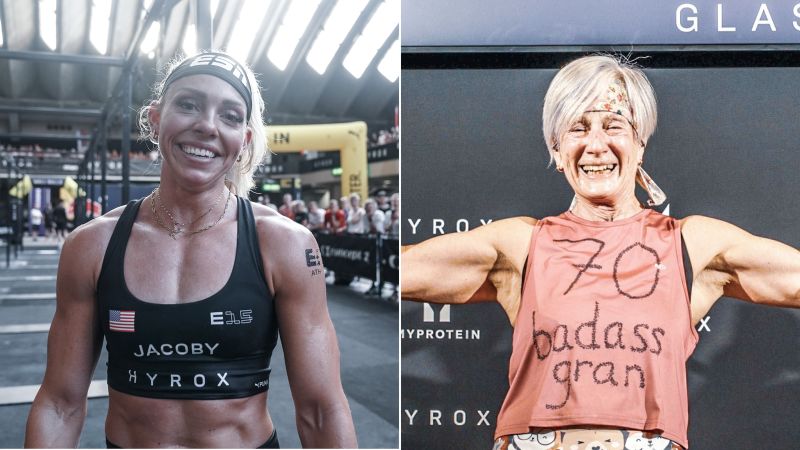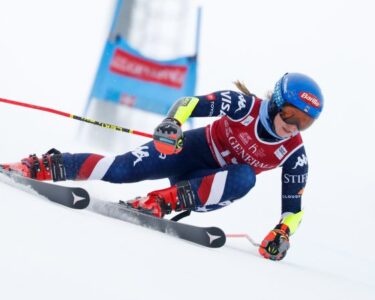CNN
—
It’s a race that requires a mesmerizing mix of strength and endurance; one that pushes the fittest of the fit to the edge of what they think is possible.
And now, after a steady start, the fitness phenomenon that is HYROX has finally found its stride.
HYROX is a functional fitness race which involves an eight-kilometer (almost five-mile) run interspersed with eight workout stations. Each station requires participants to perform a different exercise – SkiErg, sled push, sled pull, burpee broad jumps, rowing, farmer’s carry, sandbag lunges and the dreaded wall balls.
Competitors are able to compete in teams, pairs or by themselves. No matter the age or ability, the race format remains the same – the only difference being the differing weights used at the stations.
HYROX’s first iteration in 2017 saw 618 participants, while now it boasts more than 210,000 across 30 cities.
CNN recently spoke to two women at the forefront of HYROX’S charge to discover what life is like at the top of the latest fitness craze.
Meg Jacoby
Meg Jacoby is the newly crowned world champion, demolishing the elite women’s field at the World Championships in Nice, France, in June.
The American was the first ever woman to complete a HYROX race in under one hour and only recently saw her solo world record beaten by compatriot Lauren Weeks.
After she crossed the finish line, cementing her first world title, Jacoby fell to the floor in an equal measure of exhaustion and jubilation, where she was greeted by her nine-year-old daughter.
“My daughter has sacrificed just as much, if not more, than I have because she’s sacrificing a lot of time away from me so I can do what I need to do and be living my dream as an athlete,” Jacoby tells CNN Sport.
“It felt like it was all worth it. Having her there was just really, really special. She gets to witness so many strong, powerful, incredible women when she gets to watch my races – not just me.”
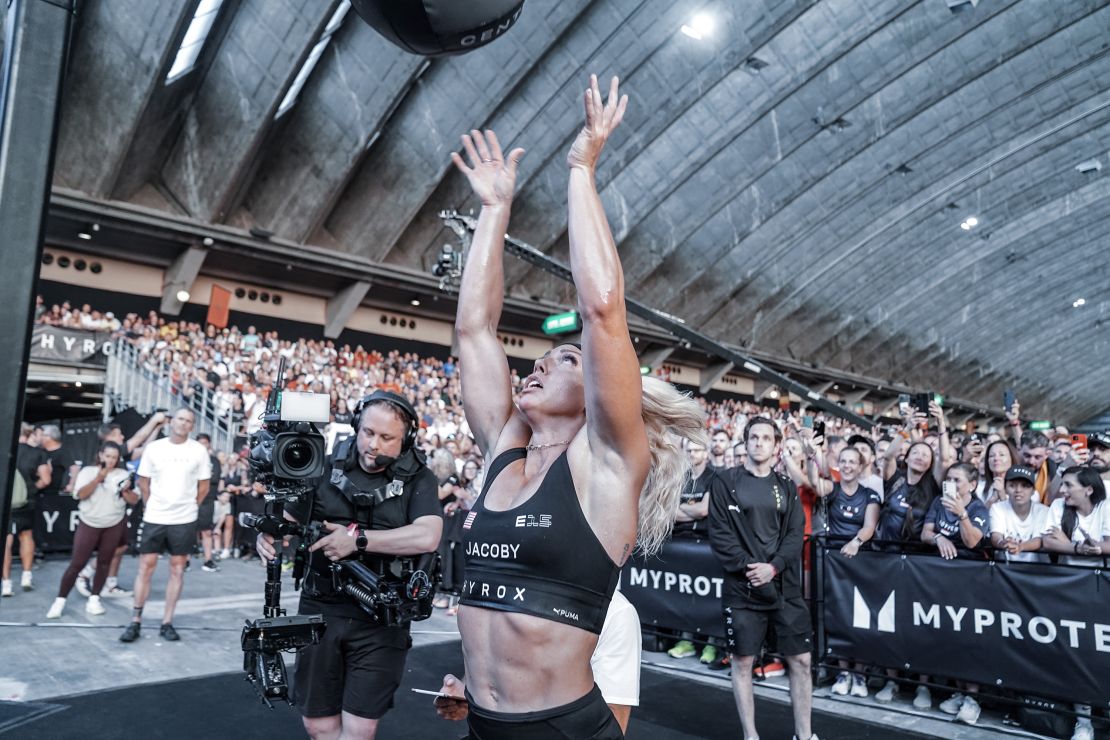
Jacoby only heard about HYROX in 2022. She signed up for the New York race later that year and started working with HYROX coach Rich Ryan.
Despite admitting to some errors during her first race, Jacoby delivered an impressive time in New York. Four weeks later, in only her second race, the American broke the then women’s pro world record in Chicago.
“At that point, I knew I should probably go all in. It was pretty crazy to have that kind of success so quickly, but it seemed like just the right sport for me,” Jacoby tells CNN.
Despite somewhat stumbling upon HYROX, Jacoby had unknowingly been preparing for the sport for years.
Her competitive streak was evident from an early age, with sports playing a major role in her upbringing – Jacoby’s brother is also a professional bodybuilder.
During college, she was an impressive middle-distance runner and has since competed in long-distance challenges. When a lot of the road races were suspended during the Covid lockdowns, Jacoby then turned her attention to powerlifting.
Before discovering HYROX, when people asked Jacoby what she was training for in the gym, her answer was emphatic: “I want to be hard to kill.”
Jacoby has now quit her day job to focus fully on being a professional athlete.
She runs up to seven times a week and combines endurance sessions with hours in the gym. Jacoby says she trains for two or three sessions per day but is aware that might sound “intimidating” to other people.
“You can have a lot of success in this without having to do that type of volume,” she says.
“That’s just kind of where I’m at and what I know works for me and what my body needs.”
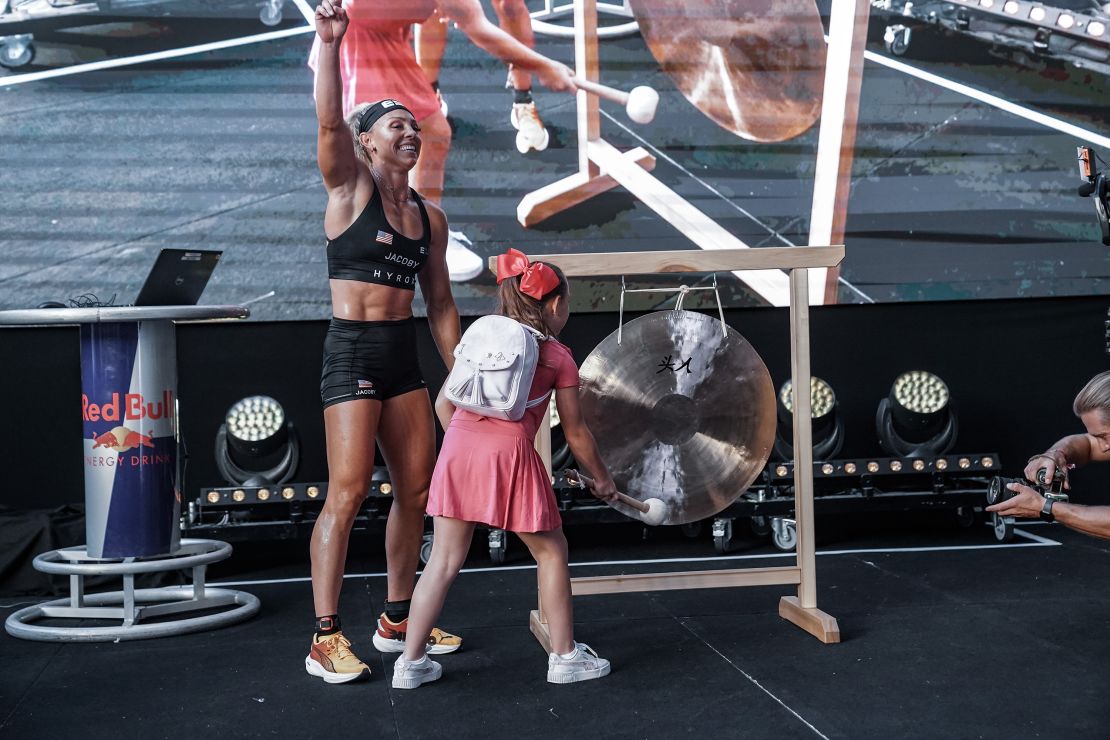
Jacoby knows the importance of diet and recovery. She aims to sleep at least eight hours every night and fuels her body with a high-carb, high-protein diet.
“My diet is very boring,” she laughs. “It’s a lot of chicken and rice. It’s kind of mundane, but that’s kind of the life of an athlete. It’s repetitive.”
Despite being in gladiator-like shape, even Jacoby struggles to describe what a HYROX race feels like.
“I think all of us at this level are a little bit crazy,” she says, explaining why she has picked such a grueling sport. “We have a lot of enjoyment for pain and suffering.”
“I’m always discovering more and more about myself as a person, pushing myself to my limits and kind of seeing what I’m made of.”
Jacoby says the sense of community is another reason she dedicates her life to HYROX and says she finds inspiration from all corners of the sport – notably some of the other mothers who balance training with raising a family.
She is also aware of another athlete, from London, who is excelling at the other end of the scale – with a badass moniker to match.
The ‘Badass Gran’
Celia Duff, who is 70, was recently crowned world champion in the 70-74 category – an accolade to go alongside the 65-69 world title she won last year.
She has also been a world record holder twice but is quick to point out that both her records have since been broken.
“I have an allotment, I have chickens, I have a dog. I help with the grandchildren, when help is needed, and pick them up from school and so on. I’m very busy doing not a huge amount,” Duff tells CNN Sport, drastically underplaying her quite astonishing achievements on an international stage.
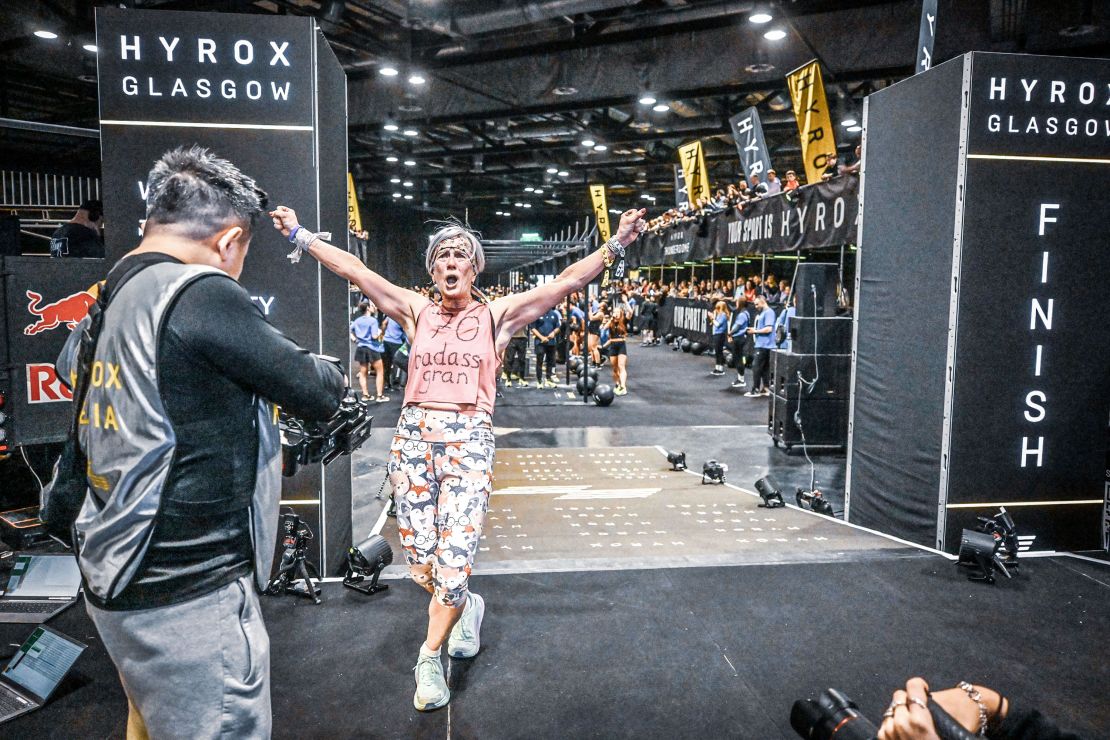
Like Jacoby, Duff found the sport of HYROX somewhat by mistake. Duff’s daughter was an early adopter of the phenomenon and one day asked her mom to come along to an event in October 2022.
Duff had always kept herself fit – she was a good rower during her youth and stepped up her fitness routine during the Covid lockdowns. But after agreeing to compete at her first HYROX event, Duff started reading up about the race and quickly realized she was in for a tough day.
Incredibly, though, she went on to break the world record for her 65-69 category, in a time which qualified her for the 2023 World Championships in Manchester, England – a race she also went on to win.
Duff says there is only a “tiny” number of people her age competing in HYROX – perhaps unsurprisingly given the physical toll it has on the body.
But for Duff, a retired public health doctor, the sport gives her focus and the training helps her to stay young.
The grandmother runs three times a week, mixing up the pace and distance of each session. She also works with a coach for her strength training and spends time practicing the exact movements she is required to do for the HYROX stations. Rest, though, is almost as important, and Duff takes at least a day off per week to allow her body to recover.
“It’s incredibly important to keep mobile and strong as you get older because, if you don’t, the rate at which you deteriorate increases,” she says, explaining the “why” behind her participation.
“I want to be strong and functionally fit. That’s the key to HYROX.”
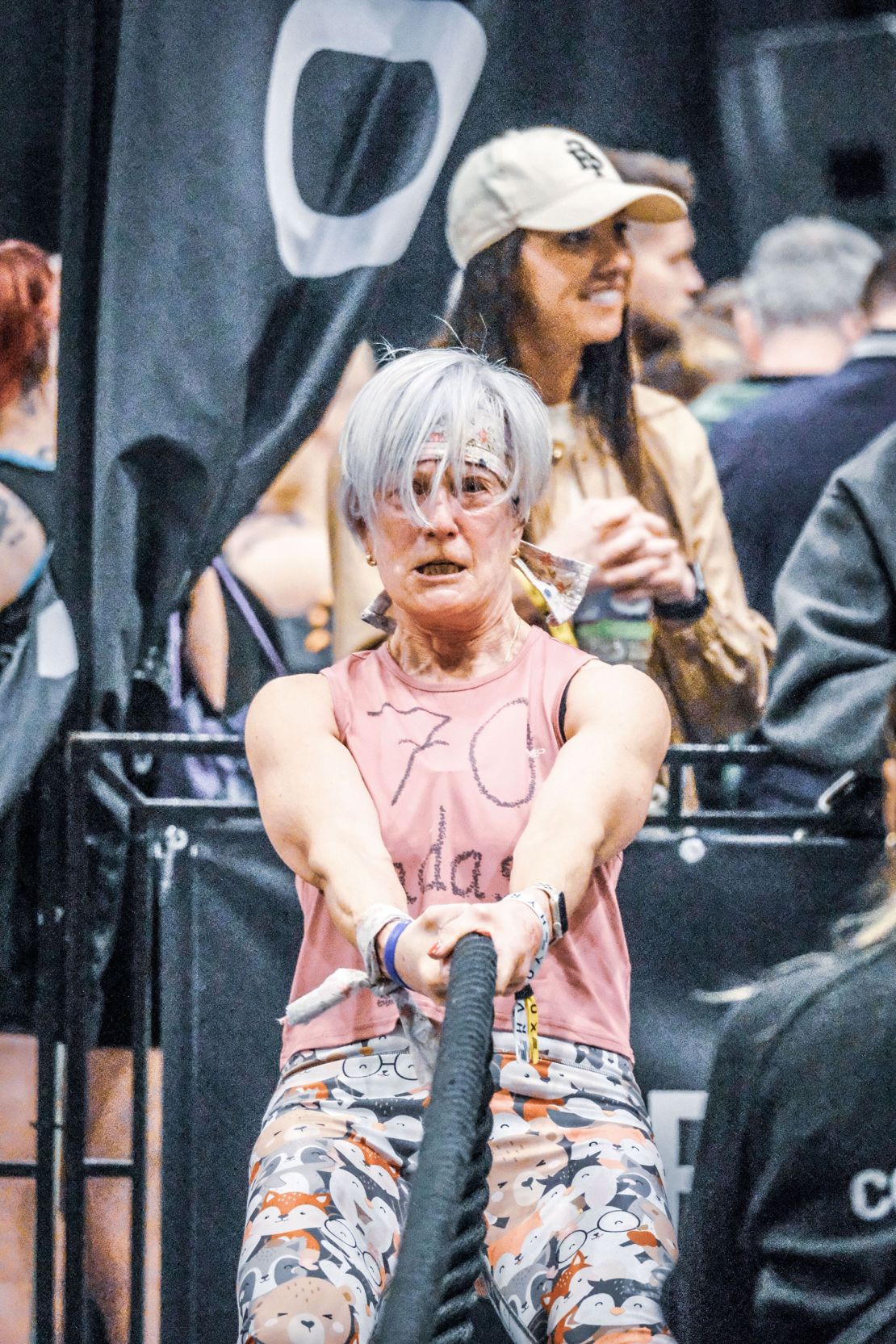
Dubbed the “Badass Gran,” Duff isn’t altogether comfortable with being called an “inspiration” to others, but a brief look through the comments posted on her Instagram demonstrates just how much she is motivating others to get fit.
“I’m genuinely humble and grateful,” she says. “If I can encourage older people or anybody, actually, just to get up and have a go, then great.”
Despite her short but impressive career as as HYROX athlete, Duff says it would be “bonkers” for her to continue racing because of the “body-breaking” work involved.
However, she does plan on competing with her daughter in a doubles event later this year and wants to continue being involved with the sport.
Olympic aspirations
Duff and Jacoby are proof that something is working for HYROX.
The business was set up in 2017 by events organizer Christian Toetzke and three-time Olympic hockey medalist Moritz Fürste.
Fürste says the concept took a while for people to understand and the business was badly hampered by Covid, which forced the cancelation of races around the world.
Now, though, HYROX is seeing exponential growth and is racing to catch up with the increased demand. Some former athletes have also tested themselves against the challenge, including former NFL linebacker Curt Maggitt and ex-soccer star John Terry.
“It took time to break through in a certain way, to really get into that wider range of people, seeing what it is and stepping out of that shadow,” co-founder Fürste tells CNN.
With its growing popularity, HYROX is now looking to further professionalize the sport, which has Olympic aspirations.
Earlier this year, anti-doping measures were brought into the single and doubles rulebooks, meaning HYROX athletes are now held to the standards of the World Anti-Doping Agency (WADA).
“We are not there yet, but if one day HYROX would be an Olympic sport, that would be the ultimate goal and achievement and just a very, very cool thing,” Fürste adds.
Before even entertaining Olympic status, though, Fürste says a governing body and national federations would need to be created – things that take time to set up.
But there is certainly appetite from the athletes, and Jacoby hopes to one day represent her country.
“You won’t be seeing me going away until then,” says Jacoby when asked about the sport’s progression towards Olympic status.
“To be an Olympic athlete is the absolute highest level you could ever reach.”


